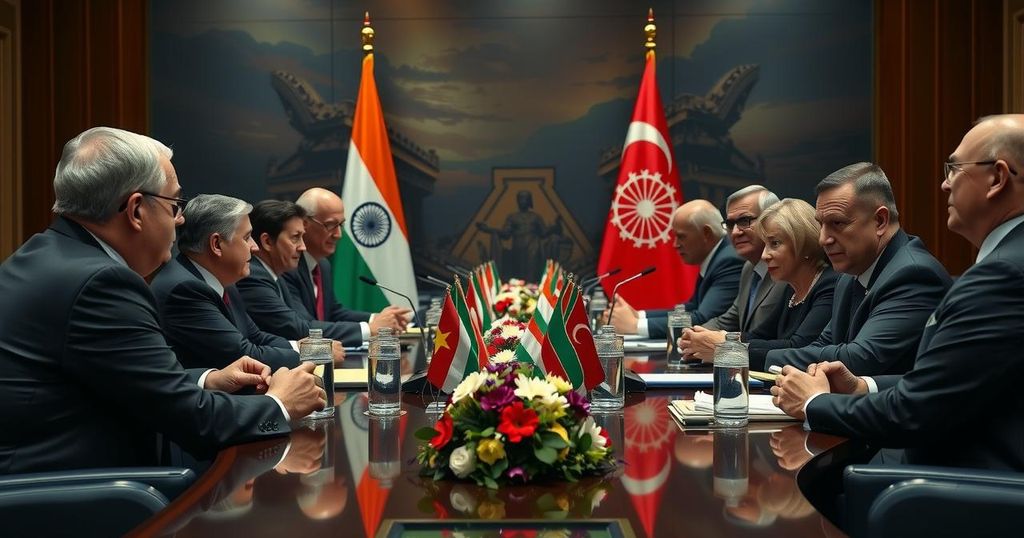Egyptian Foreign Minister Engages with Russian and Brazilian Counterparts at BRICS Summit

Egyptian Foreign Minister Badr Abdelatty met with his Russian and Brazilian counterparts at the BRICS summit in Kazan, discussing bilateral cooperation, the escalating tensions in the Middle East, and strategies for enhancing trade and humanitarian initiatives amidst ongoing conflicts in Gaza and Lebanon.
On Wednesday, Egyptian Foreign Minister Badr Abdelatty convened meetings with his Russian and Brazilian counterparts during the BRICS summit held in Kazan, Russia. Engaging with Russian Foreign Minister Sergey Lavrov, Abdelatty addressed various matters pertinent to bilateral cooperation, which included joint developmental projects. Abdelatty articulated Egypt’s apprehension regarding the escalating tensions in the Middle East, particularly focusing on the latest developments in Gaza and Lebanon. He stated, “We exchanged views on the latest developments in Gaza and Lebanon, emphasising the deteriorating regional situation and the risk of the region sliding into a regional war that could destabilise the entire area.” In light of these discussions, Abdelatty underscored Egypt’s commitments to achieving an immediate and lasting ceasefire, facilitating the release of hostages, and ensuring the delivery of humanitarian aid. Furthermore, he insisted on the necessity of de-escalating the prevailing situation. “Both ministers agreed on the necessity of ending the ongoing war in Gaza and Lebanon,” Abdelatty remarked, indicating consensus on the need for a political resolution that establishes a Palestinian state as the definitive solution to the regional conflict. Abdelatty and Lavrov also explored avenues to bolster bilateral cooperation aimed at fostering trade and advancing economic interests within the parameters of their respective BRICS membership. In a subsequent meeting with Brazilian Foreign Minister Mauro Vieira, Abdelatty sought to identify avenues for enhancing trade and investment between Egypt and Brazil through bilateral agreements, as well as initiatives inspired by the BRICS framework. This included a discussion on utilizing national currencies for commercial transactions, which the ministers deemed significant for expanding market access. In their dialogue, the representatives reiterated the critical nature of the situation in the Middle East, noting its propensity for escalation into broader conflict due to Israeli actions. They jointly advocated for an immediate ceasefire and the provision of humanitarian aid. Additionally, they deliberated on the forthcoming steps for implementing the Friends of Peace initiative, which Egypt supported since its inception during a ministerial meeting convened by China and Brazil on the Ukrainian crisis, held on the sidelines of the UN General Assembly’s high-level segment in September.
The recent meetings on the sidelines of the BRICS summit highlight Egypt’s growing diplomatic engagements amidst regional turmoil. The Egyptian Foreign Minister’s discussions with his Russian and Brazilian counterparts involved pressing issues, including the dire circumstances in the Middle East and the enhancement of trade relations among BRICS nations. The backdrop of these discussions is marked by heightened tensions related to the Israel-Palestine conflict and the implications of these tensions on broader regional stability. Furthermore, the African Continental Free Trade Agreement positions Egypt as a key player in facilitating trade within Africa, thus influencing its international diplomatic efforts.
In summary, the meetings held by Egyptian Foreign Minister Badr Abdelatty with his Russian and Brazilian counterparts at the BRICS summit serve to reinforce Egypt’s commitment to regional stability and economic cooperation. Through discussions centered on the Middle East conflict and bilateral trade enhancement, the ministers collectively underscored the urgency for a ceasefire in Gaza and Lebanon while also exploring collaboration avenues within the BRICS framework. Such diplomatic engagements are critical as they reflect the intertwined nature of regional peace and economic development.
Original Source: www.dailynewsegypt.com








